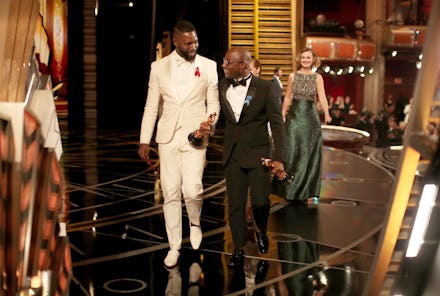Barry Jenkins explains how awards show racism has lasting effects on Black creators

It’s been more than four years since the Oscars mistakenly gave Best Picture to La La Land, only to kick all those filmmakers off the stage and award Moonlight instead. Director Barry Jenkins knows the televised chaos of that moment is etched into his legacy, which he’s not thrilled about. “I have no doubt in my mind, out of anything I ever do in my life, and who knows what’s to come ahead, but that particular moment is going to be the most visible thing that’s ever associated with me, for better or for worse,” he said on a recent episode of the “Jemele Hill Is Unbothered” podcast.
Listen, Jenkins deserves to be known for a whole lot more than an Academy Awards blunder that was entirely somebody else’s fault. For instance, his TV adaptation of The Underground Railroad hits Prime Video next week, and as someone who devoured Colson Whitehead’s masterpiece of a novel, I’m stockpiling tissues in anticipation. Anyhow, the big tragedy of the Oscars gaffe is that it robbed Moonlight of winning with no strings attached. “In a slightly sinister way, the fuck-up confirms or affirms some people’s unsavory thoughts about why the film was awarded Best Picture,” Jenkins said, adding that the blunder fueled a false narrative that Moonlight only won “because it was the Black film.”
A different sort of awards show malarkey ruined the ending of this year’s Oscars ceremony. Instead of making the evening’s climax the announcement of Best Picture, which went to Nomadland, the Academy Awards switched things up, saving Best Actor for last. In the weeks since the lackluster telecast, producers have admitted they gambled on Chadwick Boseman winning the category posthumously, which would have certainly been an emotional note to end things on. Instead, the prize went to Anthony Hopkins, who was fast asleep at home in Wales. The Oscars flashed a photo of him and rolled the credits. It was an abrupt and confusing conclusion.
The next morning, the two-time Best Actor winner posted a video acceptance speech on Instagram. “At 83 years of age, I did not expect to get this award. I really didn't,” Hopkins said. He’s now the oldest person ever to win an acting Oscar. Hopkins thanked the Academy, then added: “I want to pay tribute to Chadwick Boseman, who was taken from us far too early. And again, thank you all very much. I really did not expect this. So I feel very privileged and honored.”
Boseman is deeply mourned in Hollywood and beyond. His contributions to film before his untimely death from pancreatic cancer are astounding, and he deserves to be honored extensively. But goodness, the Oscars producers put Hopkins in an awful position, by assuming the category was Boseman’s to lose. They were banking on Best Actor being a poignant “in memoriam” moment. (Maybe that’s why the actual “in memoriam” felt so rushed?) Instead, we watched a white man pay lip service to a Black artist the Academy overlooked. The scheming for ratings was an insult to both actors.
A similar thing happened at this year’s Grammys, when Billie Eilish said she was “embarrassed” to win Record of the Year and claimed it should have gone to Megan Thee Stallion. In recent years, Adele and Macklemore have also apologized to Black artists — Beyoncé and Kendrick Lamar, respectively — when they nabbed Grammy wins. But until entertainment industry awards make sweeping changes to level the playing field for all sorts of diverse voices, these performative and unfortunate gaffes are going to keep happening.